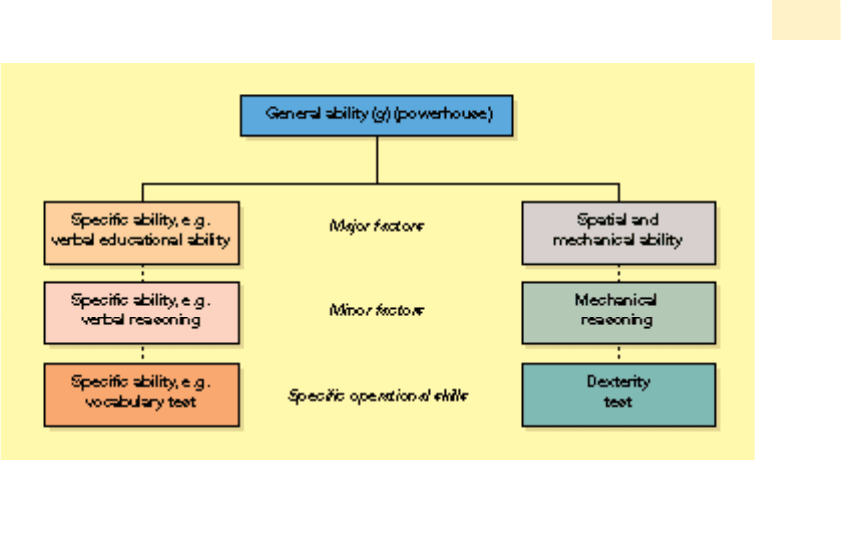Mullins L.J. Management and organisational behaviour, Seventh edition
Подождите немного. Документ загружается.


Racial harassment may also take many forms and can include:
■ racial innuendoes or offensive language, racist jokes and banter, practical jokes, the open dis-
play of racist publications, notes containing racial insults, physical assault, racist
terminology, abusive email messages, and isolation or lack of co-operation at work.
Whether the action was intended to cause offence or not does not matter – if the
employee being subjected to the behaviour finds it unacceptable and he or she feels
damaged or harmed by it, this constitutes potential harassment.
Harassment is normally characterised by more than one incident of unacceptable
behaviour, but in some circumstances just one instance may constitute harassment if it
is sufficiently serious.
52
Because the nature of human stress is complex and socially and culturally bound, it
is interesting to reflect on its possible developments. Is it the case that stress predomi-
nates nowadays because our expectations are still bound within the bureaucratic
organisations of earlier decades of work? Personal life commitments are significantly
tied into full employment and a career for life (with a 25-year mortgage and easier
credit arrangements) and yet evidence is growing of organisations’ requirements for
shorter and more flexible working patterns. Perhaps, with an increasing awareness of
the changing nature of work patterns and a reorganisation of the interface between
work and home, stress may be reduced or at the very least may be perceived in new
ways. Are we currently at the cusp of new changes where a new generation may have
differing expectations and may adapt their lives to suit a new order and style? (Stress at
work is also discussed in Chapter 18.)
It is self-evident that different occupations require different skills, competencies and
abilities. It is also the case that individuals vary with regard to their mental abilities
and the extent to which they apply them at work. The ‘happy’ scenario is one where a
match occurs between the individual’s abilities and their occupation, but reality sug-
gests that this is not always the case. The extremes include employees bored rigid with
a simple task who become careless and make a succession of mistakes, and the employ-
ees who have been promoted beyond their capability. The result could be stress either
for the individuals unable to cope, or their work colleagues who are picking up the
debris left behind. It can be assumed that a person’s ability is dependent upon his or
her intelligence, but the study of intelligence has revealed a number of controversies
and sensitivities.
In a similar vein to the studies of personality, different schools of thought have
emerged with regard to the study of abilities. Similar debates to the ones that surround
the study of personality have also swirled around the research on intelligence.
■ Is intelligence inherited? Is it constant throughout life? Is it dependent upon our
life’s experiences, our culture, our education, etc.?
■ What is the nature of intelligence? Can it be measured and how?
The nativists believe that intelligence is mostly inherited (nature), while the empiri-
cists believe that our environment shapes our behaviour and mental abilities (nurture).
Galton’s
53
thesis suggested that genius seemed to run in families and proposed that
intelligence must be inherited. He studied eminent families and noted that sons of
famous fathers also showed special talents and abilities. The notion that such sons may
have ‘rich’ and stimulating environments with the opportunity to learn and develop
talents did not enter into Galton’s argument.
CHAPTER 9 INDIVIDUAL DIFFERENCES
355
ABILITY
Is intelligence
inherited?

Cyril Burt’s influential work in the 1930s not only lent support to the genetic argu-
ment but also influenced educational policy. However, in the 1980s, his work was
discounted when fraudulent practice was uncovered. Data and the research assistants
had been invented by Burt.
54
Studies completed on twins also supported the genetic argument. Researchers used
the opportunity to study identical twins who, for whatever reasons, were separated at
birth and reared in different homes, an ideal research situation to explore the impact
of nature or nurture on adult intelligence. The twins’ intelligence was measured in
adulthood and the similarity in scores that emerged was strong evidence to support the
genetics argument. It would appear that the different family environments did not
have an impact on the intelligence measured. However, many critics argued that
although the families were different there was great similarity in terms of the social
class background. Rather than comparing twins who experienced substantial differ-
ences in their upbringing the twins had often been placed in homes which came from
a similar community – thus the genetic argument was diluted.
Howe
55
summarises recent convincing evidence to show that intervention can have
an impact on IQ. He cites evidence from early intervention programmes such as Head
Start initiatives and other schooling effects, from studies of child adoption and from
nutritional studies. Howe concludes that: ‘The empirical findings provide no support
for the pessimistic conclusion that low intelligence and the problems associated with it
are inevitable and unalterable.’
The political implications of research into the nature of intelligence are striking.
Some of the earliest theories influenced the educational philosophy of England and
Wales, including how children were selected for different types of secondary education
and the kind of help that should be given to children with special needs.
Can intelligence be measured and how?
Binet and Simon,
56
working in France, were the first psychologists to measure ability in
a systematic and structured way. They were responsible for identifying children with
special educational needs and they developed a battery of exercises for children to per-
form at specific ages. They established a mental age for each task based on the ‘normal’
ability of children and were therefore able to identify those children whose mental age
was not the same as their chronological (actual) age.
Terman
57
working at Stanford University in the United States advanced the ideas of
Binet and developed an intelligence test known as the Stanford–Binet Test which was
designed to measure intelligence across a wide scale. The tests were able to provide a
‘score’ of the child’s intelligence. The Intelligence Quotient (or IQ) was the calculation
of the:
Mental age
–––––––––––––––––––––––––––– × 100 = Intelligence Quotient
Chronological (Actual) age
Hence a child who is 10 years and has a mental age of 10 will have an IQ score of 100;
a child of 10 years with a mental age of 12 will have an IQ score of 120; and a child of
10 years with a mental age of 8 will have an IQ score of 80.
Arguments have raged within psychologists’ circles as to the nature of intelligence. Is
it dependent on a general overall factor which will have an overarching effect on spe-
cific activities? Or are specific activities independent of each other? In other words, if a
child shows a high level of ability at mathematics is this dependent on an overall high
general ability? General ability can be seen as a kind of powerhouse which releases some
of its energy into the child’s ability at mathematics. (For other children it may act as a
limiting factor.) Spearman
58
proposed a two-factor theory of intelligence and suggested
that every intellectual task involves a level of mental agility – a general factor (g) – plus
356
PART 4 THE INDIVIDUAL

specific abilities (s). This idea, developed by Ver non,
59
resulted in a model which placed
abilities in a hierarchy (see Figure 9.5). Abilities at the lower end of the hierarchy in
Figure 9.5 are more likely to correlate, so hence if a child has a good vocabulary, he or
she is more likely to have abilities in reading and comprehension too.
Cattell suggests that the g factor could be constructed as having one dimension which
is independent of any direct learning or experience. He called this fluid intelligence
which he suggested was the type of abstract reasoning ability which is free of any cul-
tural influences. The second dimension, called the crystallised intelligence, is
dependent upon learning, cultural experiences and is part of our general understand-
ing of the world around us. Bartram and Lindley
60
suggested that the two abilities
should not be seen as distinct but that:
... in effect, there is a continuum from fluid ability at one end to crystallised ability at the other. In
practice we do not have tests of ‘pure ability’ as there will always be some impact, however
slight, of our culture and background. But the distinction is a useful one.
Other psychologists have argued that the presence of ‘g’ – this powerhouse – is an
unnecessary artefact. What is important in understanding abilities is the way in which
the different abilities can be identified and measured. Thurstone
61
claimed seven pri-
mary mental abilities which can be separately measured resulting in a profile of scores:
■ spatial ability
■ perceptual speed
■ numerical reasoning
■ verbal reasoning
■ memory
■ verbal fluency
■ inductive reasoning.
Guilford
62
criticised theories which aimed to simplify intelligence into a small number
of factors. He devised a model which identified 120 different abilities and suggested
that intellectual ability requires individuals to think in one of three dimensions.
CHAPTER 9 INDIVIDUAL DIFFERENCES
357
Crystallised
and fluid
intelligence
Other models
of intelligence
Figure 9.5 A hierarchy of abilities
(Source: Adapted from P. E. Vernon, ‘The hierarchy of abilities’, in Wiseman, S. (ed.) Intelligence and Ability (first published 1967, reprinted 1968,
2nd edition 1973). This selection copyright © the Estate of Stephen Wiseman 1967,1973. Reproduced by permission of Penguin Books Ltd.)

■ Content. What must the individual think about (for example, meaning of words or
numbers)?
■ Operations. What kind of thinking is the individual required to do (for example,
recognising items, solving a problem, evaluating an outcome)?
■ Products. What kind of outcome or answer is required (for example, classifying or
reordering items)?
(See Figure 9.6.)
Guilford also expressed concern about the convergent nature of tests that required a
single solution or answer. He suggested that tests should also be looking at an individ-
ual’s ability to produce divergent answers.
Gardner
63
regarded the simplification of intelligence in terms of an IQ measure as unre-
alistic in the light of different intelligent behaviour that could be observed in everyday
life. Although intelligence tests may offer one explanation of why an individual per-
forms better in an academic institution, and may be a legitimate measure of such
behaviour, it failed to take into account the full range of intelligent activity. He sug-
gested that there was a multiple of intelligences and categorised them into six varieties
(all of which could be further divided):
Verbal Akin to the factors described in earlier theories
Mathematical
}
Spatial capacity Ability shown by artists and architects
Kinaesthetic Abilities of a physical nature
Musical Abilities of musicianship
}
Interpersonal – skills with other people
Personal intelligences Intrapersonal – knowing oneself
358
PART 4 THE INDIVIDUAL
Intelligence –
one or many?
Memory
Operation = what
the person does
Product = the
form in which the
information is
processed
Content = the
type of material
on which the
operations are
performed
Operation
Evaluation
Convergent production
Divergent production
Cognition
Units
Relations
Systems
Transformation
Implications
Figural
Symbolic
Semantic
Behavioural
Content
Product
Classes
5 × 4 × 6 = 120 categories,
each representing at least one
factor of human ability
Figure 9.6 Guilford’s structure of the intellect model
(Source: J. P. Guilford, ‘Three faces of intellect’, in Wiseman, S. (ed.) Intelligence and Ability
(first published 1967, reprinted 1968, 2nd edition
1973). This selection copyright © the Estate of Stephen Wiseman 1967,1973. Reproduced by permission of Penguin Books Ltd.)

Emotional intelligence
An elaboration of some of Gardner’s ideas was made by Goleman
64
who agreed that the
classic view of intelligence was too narrow. He felt that the emotional qualities of indi-
viduals should be considered. These, he felt, played a vital role in the application of
intelligence in everyday life. He identified the key characteristics as:
abilities such as being able to motivate oneself and persist in the face of frustrations; to control
impulse and delay gratification; to regulate one’s moods and keep distress from swamping the
ability to think; to emphasise and to hope.
Emotional intelligence has received considerable attention over the last few years as
the concept has been identified as a key aspect of managing people effectively.
Goleman suggests that emotional intelligence or EI predicts top performance and
accounts for more than 85 per cent of outstanding performance in top leaders.
65
The
Hay Group working with Goleman have identified 18 specific competencies that make
up the four components of emotional intelligence and have produced an inventory
designed to measure Emotional Competence (see Figure 9.7). The Emotional
Competence Inventory defines EI as: ‘The capacity for recognising our own feelings
and those of others, for motivating ourselves and for managing emotions within our-
selves and with others.’
66
Research work into the effects of an emotional literacy policy at school demonstrates
that children who feel safe, understood and appreciated for the things they do well are
also more focused, more open to ideas and more willing to work at school. The schools
that perform better are those that place emotional literacy first. Simple methods are
used: ‘Quality Circle time’, ‘Talk time’, ‘Friendship Stop’, ‘Quiet Rooms’ – learning
environments which encourage the students to discuss non-curriculum problems and
help them resolve problems. The aim is to develop qualities that enable the students to
become effective learners by developing their sense of self and sense of self-worth,
qualities which are transferable into the work situation.
67
CHAPTER 9 INDIVIDUAL DIFFERENCES
359
SOCIAL
AW ARENESS
SELF-
MANAGEMENT
SELF-
AWARENESS
RELATIONSHIP
MANAGEMENT
• developing others
• inspirational leadership
• change catalyst
• influence
• conflict management
• teamwork and
collaboration
• developing others
• inspirational leadership
• change catalyst
• influence
• conflict management
• teamwork and
collaboration
• emotional self-control
• transparency
• adaptability
• achievement orientation
• initiative
• optimism
• empathy
•organisational awareness
• service orientation
• emotional self-awareness
• accurate self-assessment
• self-confidence
Figure 9.7 Emotional Intelligence Competence Model
(Reproduced with permission from Hay Group © 1999 Hay Group Limited. All rights reserved.)

The early tests of intelligence have evolved into a large psychological business. Most
people will have taken a psychological test of one kind or another by the time they are
an adult in employment. Tests may be administered at school, college or as part of the
selection assessment process at work. The use of tests is widespread and growing. They
are perceived to be useful as an objective discriminating tool, but they are not without
controversies and sensitivities.
Tests are broadly divided by the British Psychological Society into:
1 Tests of typical performance. These assess an individual’s typical responses to given
situations. Answers are not right or wrong but identify choices, preferences and
strength of feelings. Personality assessments and interest inventories are examples of
such tests.
2 Tests of maximum performance. These assess an individual’s ability to perform effec-
tively under standard conditions. Performance on these tests, which include ability
and aptitude tests, can be judged as right or wrong. Ability tests come in many dif-
ferent forms and may test a general intellectual functioning or a specific ability
(such as verbal reasoning, numerical reasoning, etc.).
Alice Heim (cited in Anastasia) developed a series of general ability tests – AH series –
which are widely used to assess general ability. They test three key areas: verbal,
numerical and diagrammatical reasoning. For example, an individual would be asked
questions similar to the following:
Modern Occupational Skills Tests are an example of specific ability tests and measure a
range of clerical and administrative skills: verbal checking; technical checking; numeri-
cal estimation, etc. They claim to be an aid in the selection of administrative staff.
Their tests are short and can be used singly or together as a battery of tests. The indi-
vidual would be asked questions similar to the following:
Some tests are designed to be given individually whereas others are suitable for admin-
istering within a group situation. However, there are certain minimum features and
standards of conditions which distinguish psychological tests from other forms of
PART 4 THE INDIVIDUAL
Which one of the five words on the right bears a similar relation to each of the two
words on the left?
ABCDE
sensible noise sound judgement tone silly sensitive
The two figures on the left have a feature in common. One, and one only, of the
figures on the right lacks this feature. Which is it?
ABCD E
TESTING
360

informal assessments; tests are essentially ‘an objective and standardised measure of a
sample of behaviour’.
68
Features of psychological tests
Psychological tests have certain standard features:
1Tests will comprise a standard task, or a set of questions with a standard means of
obtaining the score.
2A technical manual will explain what the test is measuring, how it was constructed,
the procedures for administering, scoring and interpreting the test.
3 Details of the test’s validity (what the test claims to be measuring – and what it is
not measuring) and reliability (the test’s ability to measure consistently) will also be
shown in the manual along with the inferences that can be drawn from the data.
For a test to be considered as a psychological instrument it must be objective, stan-
dardised, reliable, valid and discriminating (but not discriminatory). The selection and
choice of the test should be based on a number of other key features such as its accept-
ability, practicality, time, costs and perceived and actual added value.
All tests have limitations. Tests can only sample behaviour at one particular moment in
time. The information they provide is dependent upon good testing practice and will
only add further evidence to the decision-making process. Tests will not provide the
answer. Some individuals are very nervous and may not perform at their best and
indeed some may feel indignant that they are obliged to take a test at all.
Jackson
69
identifies a central area of concern in his discussion of fairness in testing.
He distinguishes between fairness of outcome and fairness of process. In the selection
process fairness of outcome implies ‘choosing the best person for the job’. This is
dependent upon measures of later performance to confirm the predictive validity of
the test. Such processes are essential if organisations are to be certain of the value of
tests and are not merely using tests as an administrative convenience to keep the short-
list shorter! By fairness of process, Jackson refers to errors and bias that can occur
during the testing process. Some problems can be limited by good testing practice, but
other sources of bias are more complex. Certain tests have been found to show differ-
ences in average performance levels between men and women or between different
racial or ethnic groups. Feltham et al. suggests that the test may not in itself be unfair
but using the test will lead to different outcomes and different proportions of people
being selected.
70
Some tests have been found to have an adverse impact. Psychologists
need to work with personnel professionals to be certain that all parts of the testing
process are fair and objective.
Tests should be kept under review. Were they useful? Did they enable a confident
prediction of future work behaviour and performance? Unfortunately, many organisa-
tions may spend considerable time and money on training and in choosing a test, but
then do not perform adequate research and set up suitable evaluation procedures for
testing the test. If organisations do not treat the candidate fairly – that is, provide them
with feedback of results – a damaging impact on the reputation of the organisation can
result. The testing process means that candidates spend a considerable amount of their
own personal time on a process which is demanding and potentially intimidating. If
they feel they have been treated with respect they maintain a positive image of the
organisation even if it has rejected them.
71
The personal, intrusive and threatening
nature of the psychological tests should not be forgotten.
Exhibit 9.1 illustrates the main arguments for and against the use of psychological tests.
CHAPTER 9 INDIVIDUAL DIFFERENCES
361
Limitations of
tests

There are no limits to the attitudes people hold. Attitudes are learned throughout life
and are embodied within our socialisation process. Some attitudes (such as religious
beliefs) may be central to us – a core construct – and may be highly resistant to any
change, whereas other, more peripheral attitudes may change with new information or
personal experiences. Specific events, particularly traumatic ones such as redundancy,
may have a dramatic effect on our attitudes.
So what are attitudes and how can they be distinguished from beliefs and values?
■ Attitudes can be defined as providing a state of ‘readiness’ or tendency to respond
in a particular way.
72
■ Beliefs are concerned with what is known about the world; they centre on what ‘is’,
on reality as it is understood.
■ Values are concerned with what ‘should’ be and what is desirable.
Gross suggests that
to convert a belief into an attitude, a ‘value’ ingredient is needed which, by definition, is to do
with an individual’s sense of what is desirable, good, valuable, worthwhile and so on.
It has been suggested by Gross that whereas ‘adults may have thousands of beliefs,
they may have only hundreds of attitudes and a few dozen values’.
73
Hofstede defines
values as a ‘broad tendency to prefer certain states of affairs over others’.
74
Katz has suggested that attitudes and motives are interlinked and, depending on an
individual’s motives, attitudes can serve four main functions.
■ Knowledge. One of the major functions is to provide a basis for the interpretation
and classification of new information. Attitudes provide a knowledge base and
framework within which new information can be placed.
■ Expressive. Attitudes become a means of expression. They enable individuals to
indicate to others the values that they hold and thus to express their self-concept
and adopt or internalise the values of a group.
■ Instrumental. Held attitudes maximise rewards and minimise sanctions. Hence,
attitudes towards other people (or objects) might be held because of past positive (or
negative) experiences. Behaviour or knowledge which has resulted in the satisfaction
of needs is thus more likely to result in a favourable attitude.
■ Ego-defensive. Attitudes may be held in order to protect the ego from an undesir-
able truth or reality.
75
362
PART 4 THE INDIVIDUAL
1 They make decisions about people
– more systematic
– more precise.
2 They predict future performance and reduce uncertainty.
3 They provide more accurate descriptions of people and
their behaviour. Precise definitions and measured vari-
ables lead to further studies and improve understanding
of the relationship between tests and performance.
But
■ Tests should be seen as an additional source of
information only.
■ Tests may be expensive and time-consuming.
■ Without proper professional practice, they can be
misused and results abused.
■ They may be seen as an intrusion.
■ They may be regarded as inappropriate.
■ Practice may have an effect on test results.
Why use psychological tests?
EXHIBIT 9.1
ATTITUDES
The functions
of attitudes

Is it possible to predict behaviour, if we know an individual’s attitude?
Research suggests the answer is ‘No’. It seems that we do not always behave in a way
that is true to our beliefs; what we say and what we do may be very different. Such evi-
dence indicates that attitudes can be revealed not only in behaviour but also by the
individual’s thoughts (although these may not be revealed in public) and by feelings,
the strength of which demonstrates the extent to which the attitude is a core or
peripheral construct.
A classic study by La Piere illustrates this point. Visiting American hotels and restaur-
ants with a Chinese couple, La Piere found no sign of prejudiced attitudes in the
face-to-face situation, but there were marked racist attitudes in the follow-up attitude
survey. He found complete contradictions between public and private attitudes.
76
These findings have important implications for the study of attitudes and reveal two
important issues for the psychologist and manager.
1Attitudes cannot be seen; they can only be inferred.
Given that the attitudes employees hold are important for morale and the effectiveness
of organisations, it is important that there is confidence in the measurement tech-
niques used to assess the strength of attitudes. As attitudes are inferred, heavy reliance
is placed therefore on the accuracy of assessment. Although there are a number of dif-
ferent techniques which could be used to measure attitudes, the two most common
techniques are direct observation and self-reporting techniques.
All of us observe others and assess attitudes on the basis of communication style
(both verbal and non-verbal) and behaviour. This is an example of an informal
approach – unsystematic, spontaneous and based on our understanding of social cues.
We may be wrong in our judgement. Students who turn up late for classes, slouch on
their seat and do not ask questions may still hold very positive attitudes towards the
subject. Managers may also be erroneous in their assumptions and beliefs about their
colleagues (both subordinates and superiors). Their beliefs may never have been tested
out – merely assumed to be correct.
Serious mistakes can be made when dealing with people across different cultures.
For instance eye contact in Western countries is normally associated with confidence,
politeness and attentiveness but in some African countries may be seen as rude and
disrespectful. Bulgarians nod when they mean ‘no’ and shake their heads when they
mean ‘yes’ while the Greeks nod upwards or raise their eyebrows for ‘no’ and shake the
head side to side or tilt it to say ‘yes’. A lack of ‘cultural literacy’ can lead to incorrect
assumptions, poor relationships and a failure to make useful business connections.
77
Organisations which assess their employees’ attitudes by using attitude question-
naires (self-reporting techniques) are attempting to systematically gauge and measure
these assumptions. Attitude questionnaires are time-consuming to design and adminis-
ter. The questions asked, their relevance, style and length are all important variables in
the validity of the questionnaire. So, too, is the honest completion of questionnaires.
Making public people’s private attitudes may also have its dangers as expectations of
change may be envisaged. If these do not occur, disappointment and low morale may
be the result.
78
(See also the discussion on the Johari window in Chapter 14.) Attitude
questionnaires are used by many companies as a barometer for the attitudinal climate
of organisations and as such enable managers to be in touch with employees’ views
and feelings. (See Table 9.7.)
CHAPTER 9 INDIVIDUAL DIFFERENCES
363
Prediction of
behaviour

2Attitudes are often shared within organisations and as such are embodied in the
culture of organisations.
Classic research has shown the influence of the wider community in the formation of
orientations towards work. Differences in class/orientation may elicit a range of loyalties
and possibly produce opposing perceptions of commitment, loyalty and co-operation.
Attitudes are not just individually formed but arise out of interaction with others. They
are often ‘locked-in’, often regarded as obvious, mere common sense, and are so much
taken for granted that they may be overlooked. Sharing the belief system of others also
has affective outcomes. If people feel that they belong and are included, it enables them
to feel good about working in an organisation. If, on the other hand, people do not feel
part of the organisation – if they feel that they do not share the dominant attitudes and
beliefs – negative emotional consequences are likely to result.
Researchers of organisational culture suggest that it is the shared perceptions of daily
practices that are at the core of organisational cultures.
79
‘The reality of everyday life is
taken for granted as reality.’
80
(Organisational culture is explored in more detail in
Chapter 22.) Implications of the unquestioning nature of ‘reality’ of what can or cannot
be done can lead to individuals becoming ‘culturally blinkered’. Insitutionalised atti-
tudes result. Major problems arise when these attitudes are formed on the basis of
stereotypes and prejudice as was evidenced in the Stephen Lawrence Inquiry:
Unwitting racism can arise because of lack of understanding, ignorance or mistaken beliefs. It
can arise from well intentioned but patronising words or actions. It can arise from unfamiliarity
with the behaviour or cultural traditions of people or families from minority ethnic communities.
It can arise from racist stereotyping of blackpeople as potential criminals or troublemakers.
364
PART 4 THE INDIVIDUAL
Please tick one box that most closely represents how you feel Strongly Strongly
about each statement disagree agree
I believe in what OrgCo is trying to achieve 12345
I enjoy discussing OrgCo with people who do not work here
I know how my job contributes to OrgCo’s aims and objectives
Good and bad news about what is happening at OrgCo is communicated regularly
My values and those of the organisation are very similar
Right now, staying with OrgCo is a matter of necessity as much as desire
I am constantly interrupted in my work
I enjoy my job
I am encouraged to seek out new training opportunities
My manager discusses with me ways in which I can improve my work performance
OrgCo is serious about removing barriers to ensure equality of opportunity
Staff at OrgCo regularly help and support each other at work
I lack direction from my manager
When things do not go well in our team/department we learn from the experience
Communication within my team is positive and effective
Taking everything into account I have a high level of job satisfaction with my team
Table 9.7 An example of an attitude questionnaire
